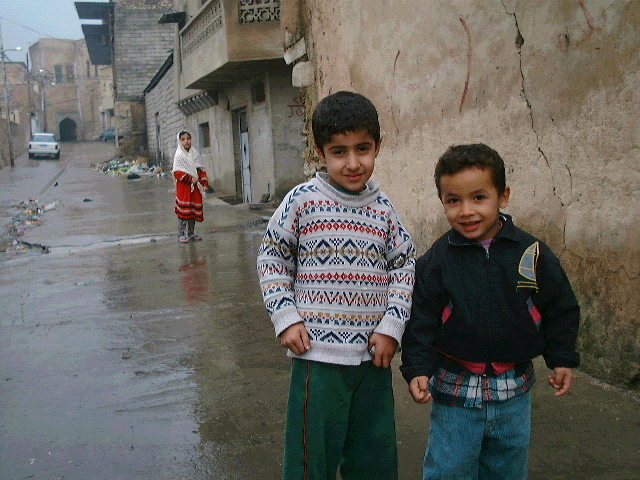
Photo by Paul Chan: Kids in the rainy street near the "leaning mosque" in downtown Mosul
In 2003 Micah Shristi Describes Iraq on the Brink of War
theCopyExchange — 01/13/2003 — by Micah Shristi
Amman, Jordan — In northern Iraq as in Baghdad, Muslims and Christians have lived together in harmony for hundreds of years. Rhetoric and threats of full-scale war from Washington are beginning to disrupt that harmony.
“When Mr. Bush called the invasion of Afghanistan a ‘crusade’ it made a lot of people here very nervous,” says Father Akhmed a Dominican priest at “Clock” Church in Mosul.
Although Bush’s aides quickly had him apologize for the remark, Father Akhmed says the damage was already done. Many Muslims here already perceived US aggression as anti-Islamic, and Bush’s remark just confirmed that suspicion.
Christians here worry that a regime change in Iraq could mean that radical Islamic factions take power and diminish the rights and freedoms of Christians afforded by the current secular government in Baghdad.
Minority Muslim groups and have similar concerns about US-influenced regime change. Although many top Iraqi officials are Sunni, a Shiite and a Christian sit on the seven-member Revolutionary Council. The current government provides security guards for minority Shiite pilgrimage sites and pilgrim groups. Sufi mosques are increasingly attended throughout the country.
“I hope in your visit to Iraq you have discovered that Islam—like all religions—is a religion of love and peace.” says Dr. Ali Abuteebu, a representative for the Sufi Muslim leader Al Sheikh Mohammad Abdul Khareem.
Sipping on a glass of sweet Iraqi tea he continues, “It is more difficult to build than destroy. By killing our people and destroying our buildings America does not show that it is strong. Why don’t the Americans build the people of Iraq by sending medicines and food and by participating in our economy?”
The sound of air raid sirens in Mosul is an almost everyday experience according to Sister Shereen, a Dominican nun. People are struggling to deal with the bombings that often follow the sirens.
“It is our job in the church to help take this pain from our people, but how can we?” she says speaking of what she describes as “deep psychological pain” that comes from loss of life as well as fear of American bombings.
During the Gulf War, a US plane dropped a bomb on the church next to Sister Shereen’s convent. Several members of the five families who were taking refuge there were killed. The church has recently been rebuilt.
The US military is getting increasingly aggressive in its bombing campaigns in the no-fly-zones, especially in the South, but also in the North near Mosul.
US fighter pilots apparently have been ordered to take more risks, using lower flight plans and attacking more controversial targets. Some conjecture that military planners hope to provoke an incident, such as a US plane getting shot down, to give an excuse to begin a full-scale invasion.
This is an immoral and dangerous strategy for many reasons. It puts US pilots at great risk of being harmed by Iraqi anti-aircraft fire. Furthermore, the bombing of Iraqi military targets puts nearby civilians and civilian infrastructure at risk. On Jan. 1 AFP reported on three bombings that affected civilians.
Sister Shereen and Father Akhmed sent me off with a song. They chanted the Lord’s Prayer in their native language Aramaic. Iraq is home to the world’s largest population of native speakers of the language Jesus spoke, with some 300,000 Aramaic-speaking Christians living mostly in and around Mosul.
“Give us this day our daily bread and forgive us our trespasses as we forgive those who trespass against us.”